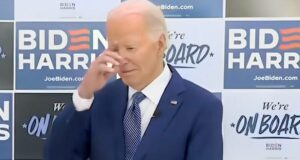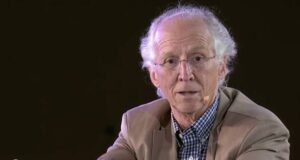Missourians are voting on two amendments to the State Constitution. Amendment 1 deals with term limits and Amendment 3 deals with lobbying gifts and who controls redistricting.
Of the two, Amendment 3 is getting the most attention and has the biggest impact on voters so we’ll start there.
First, we are recommending a YES vote on Amendment 3. Here’s why.

Dwight Widaman, Metro Voice Editor
Amendment 3 is a response to the 2018 voter-approved “Clean Missouri” ballot measure which required a demographer appointed by the State Auditor, in this case Democrat Nicole Galloway, to unilaterally redraw state legislative districts. The Clean Missouri ballot measure, while having a name that few could disagree with, was funded by millions of dollars from organizations associated with liberal billionaire George Soros, Hollywood types and organizations like Planned Parenthood. Many voters later realized their error, having been deluded by slick campaign ads and mailers from Clean Missouri and dark money groups.
Amendment 3 aims to correct what many see as a gross politicization of redistricting. This new amendment transfers that responsibility to a governor-appointed bipartisan commission. Regardless if a future governor is Democrat or Republican, the commission will be made up individuals from both parties. Amendment 3 also places a ban on gifts from lobbyists to lawmakers, something that opponents say is a distraction. But Clean Missouri also used a gift ban to generate more support for that measure as well.
State Sen. Dan Hegeman, R-Cosby, is the sponsor of Amendment 3. He notes his sprawling district, which has 15 counties, is the largest senatorial district in the state and is also the most rural district. Agriculture is the largest industry in northwest Missouri. Hegeman said he respects communities of interest, both urban and rural.
“It is my great concern that our communities will find their voices diminished in Jefferson City (in the state Legislature), because of the liberal think-tank ideas contained in the criteria of Amendment One, passed in 2018,” Hegeman said.
“No On 3” director Sean Soendker-Nickolson disagrees, saying that the aim of Amendment 3 is to create “super-safe districts” where politicians don’t have to worry about voters back home.
Hegeman opposes the idea of a demographer. “You know it puts in charge in a great capacity an unelected bureaucrat that really would redraw how we do the state of Missouri, with fairly limited abilities to select that individual,” he said.
But there is a political aspect to it. Missouri’s legislature is overwhelmingly conservative – fueled by “red” districts in suburban and rural areas of the state. In fact, most of the State’s liberal legislators typically hail from high-density urban areas with concentrations of college students. Think urban Kansas City and St. Louis, Columbia, St. Joseph and Springfield. Republicans are comfortably represented in many St. Louis and Kansas City suburbs, small towns and rural areas.
Democrats hope that through redistricting, legislative districts could be gerrymandered in such a way as to force rural and suburban voters into more urbanized districts where they are grossly outnumbered, thus watering down the political voice of those voters. For example, voters in conservative northern Cass County, which includes several Kansas City suburbs, small hamlets and sprawling farmlands, could have their districts changed so they are represented by Democrat-heavy districts in Grandview or South Kansas City.
Amendment 3 is opposed by Planned Parenthood, the Soros-funded Moms Demand Action (gun control) and the pro-abortion group NARAL (National Abortion Rights Action League). Amendment 3 is opposed by the state’s liberal newspapers, including the largest – the St. Louis Post-Dispatch.
Official Ballot Title
Amendment 3 [full text]
Official Ballot language:
Shall the Missouri Constitution be amended to:
- Ban gifts from paid lobbyists to legislators and their employees;
- Reduce legislative campaign contribution limits;
- Change the redistricting process voters approved in 2018 by: (i) transferring responsibility for drawing state legislative districts from the Nonpartisan State Demographer to Governor-appointed bipartisan commissions; (ii) modifying and reordering the redistricting criteria.
State governmental entities expect no cost or savings. Individual local governmental entities expect significant decreased revenues of a total unknown amount.
Fair Ballot Language:
A “yes” vote will amend the Missouri Constitution to reduce the limits on campaign contributions that candidates for state senator can accept from individuals or entities by $100 per election. There is no change for candidates for state representative.
The amendment prohibits state legislators and their employees from accepting a gift of any value (which is currently $5) from paid lobbyists or the lobbyists’ clients.
The amendment modifies the criteria for redrawing legislative districts and changes the process for redrawing state legislative district boundaries during redistricting by giving redistricting responsibility to a bipartisan commission, renames them, and increases membership to 20 by adding four commissioners appointed by the Governor from nominations by the two major political party’s state committees.
A “no” vote will not amend the Missouri Constitution regarding campaign contributions, lobbyist gifts, and the process and criteria for redistricting.
If passed, this measure will have no impact on taxes.
[Proposed by 100th General Assembly (Second Regular Session) SS3 SJR 38]
Amendment 1 creates term limits on additional state-wide offices
Constitutional Amendment 1 would require the lieutenant governor, secretary of state, attorney general and state auditor to leave office after eight years. It would limit them each two terms of office in a lifetime. The state constitution currently limits the governor and state treasurer to two terms of office in a lifetime but not the other executive offices.
Amendment 1 was put forth by a Republican State Senator Tony Luetkemeyer.
It has both supporters and opponents within the Republican Party. Luetkemeyer stated, “The voters of Missouri have made it clear they emphatically support term limits. This measure will bring consistency to our term limits for all state officials and prevent them from becoming career politicians.”
Missouri State Senator Ed Emery (R) has stated “We want people in there who are experienced and know the job and know what they’re doing. I do think that those are a little different categorically and functionally than those top executive positions.”
Before 1965, the state constitution limited the governor to one term in office. Amendment 1 passed in 1965 with 73 percent of the vote. It allowed a person to serve as governor for no more than two terms.
As of 2019, Missouri was one of eight states to limit the governor to two terms in a lifetime.
University of Central Missouri political scientist Robynn Kuhlmann says Missourians are generally concerned about how career politicians can be influenced by lobbyists. She points to research that has shown term limits might make the connection between politicians and lobbyists stronger.
In the legislature, newer lawmakers “aren’t informed as to the legislative process. They lack institutional experience, and some of them may rely more on the information that lobbyists give,” Kuhlmann told the Associated Press.
Supporters say expanding term limits to all statewide offices would bring consistency across the offices, and would prevent career politicians. Opponents argue the amendment would solve a problem that doesn’t exist, and would deprive statewide offices of experienced administrators, radio station KCUR reported.
Democrat Marc Powers, Chief of Staff for the House minority leader’s office says, “Although only about a dozen people have served more than eight years in any of those offices throughout Missouri history, Amendment 1 supporters say it would create uniformity with the offices of governor and state treasurer, which have been subject to a two-term limit since the 1960s. Opponents say leaving it to voters to decide how long a particular person stays in office has worked well for a long time and there’s no compelling reason to limit their choices.”
For the most part, Democrats have not been vocal on Amendment 1.
Official Ballot Title
Amendment 1 [full text]
[Proposed by 100th General Assembly (First Regular Session) SS SCS SJR 14 & 9]Official Ballot language:
Do you want to amend the Missouri Constitution to extend the two term restriction that currently applies to the Governor and Treasurer to the Lt. Governor, Secretary of State, Auditor and the Attorney General?
State and local governmental entities estimate no costs or savings from this proposal.
Fair Ballot Language:
A “yes” vote will amend the Missouri Constitution to impose a two term restriction on all statewide elected officials, which currently only applies to the Governor and Treasurer.
A “no” vote will leave the terms that statewide elected officials may serve unchanged.
If passed, this measure will have no impact on taxes.
The amendment prohibits state legislators and their employees from accepting a gift of any value (which is currently $5) from paid lobbyists or the lobbyists’ clients.
The amendment modifies the criteria for redrawing legislative districts and changes the process for redrawing state legislative district boundaries during redistricting by giving redistricting responsibility to a bipartisan commission, renames them, and increases membership to 20 by adding four commissioners appointed by the Governor from nominations by the two major political party’s state committees.
A “no” vote will not amend the Missouri Constitution regarding campaign contributions, lobbyist gifts, and the process and criteria for redistricting.
If passed, this measure will have no impact on taxes.
–Dwight Widaman | Metro Voice
 Metro Voice News Celebrating Faith, Family & Community
Metro Voice News Celebrating Faith, Family & Community 






